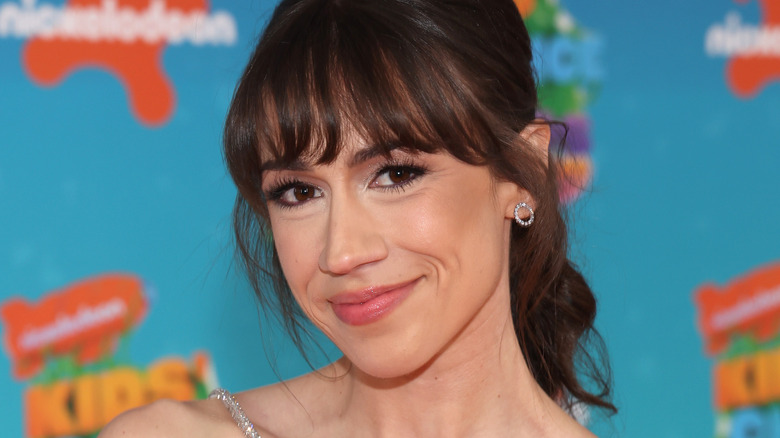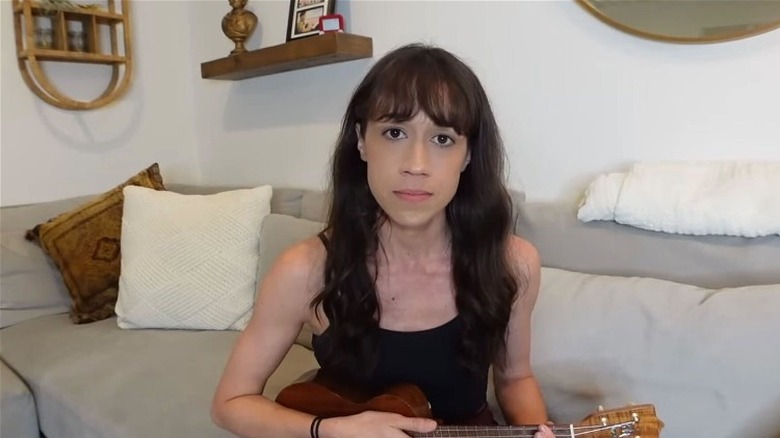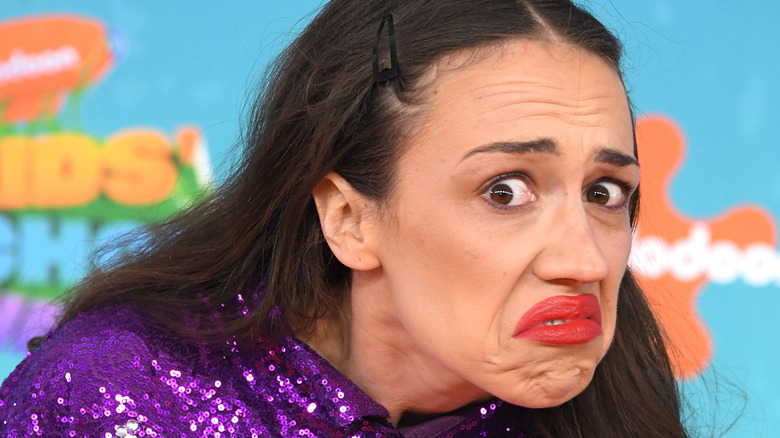Colleen Ballinger's Apology Song Is The Opposite Of Accountability
If you've been anywhere near the internet over this past week, you've probably heard that vlogger Colleen Ballinger has been accused of grooming. Ballinger, 36, is best known for her YouTube persona, Miranda Sings, a character she has been performing as for over a decade. To date, her videos as Miranda have earned her a following of 10 million subscribers. But while Miranda Sings may have granted Ballinger popularity for her musical comedy, Ballinger is now learning that you can't sing your way out of facing the music.
Back in 2020, fellow YouTuber Adam McIntyre spoke out about Ballinger's inappropriate behavior toward her younger fans. The creator accused Ballinger of starting a group chat with teenagers– while she was in her 30s — in which she made sexual comments, such as asking about the status of their virginity. He also said that she mailed him lingerie and badmouthed him to his online community. McIntyre presented screenshots to back up his allegations. Others have since come forward about Ballinger's crude treatment of minors at her live shows and her past racist content, with the most recent accusations coming earlier this month.
Ballinger responded to the backlash back in 2020 and owned up to some of her mistakes, while still concluding, "But, I am not a monster, and I am not a groomer." Yet, now that her ghost of bad apologies of thepast has come back to haunt her, she's made a rather baffling choice: to respond in song, and that song is the furthest thing from the accountability folks were hoping for.
Colleen Ballinger's song is about toxic gossip; not about what she did
On June 28th, Ballinger uploaded a video to her YouTube channel, @ColleenVlogs, titled "hi." Folks were certainly expecting this to be an apology or acknowledgement of the accusations against her. And, she was surely counting on this fact, since she deliberately started the video looking melancholy and sitting in silence before making the bold choice to pick up a ukulele. What follows is a ten minute long song she wrote for the occasion, which shows very little remorse or acknowledgment of the feelings for those she victimized. Ballinger captioned the video, "I do not condone or support any kind of online bullying or hate towards anyone," but the statement feels cheap given that she spends most of the video talking about the backlash she has received. At one point, she says, "sorry" but quickly shifts gears by adding,"I didn't realize all of you are perfect," thus making her defensiveness about the situation quite clear. She also later doubles down on denying the allegations by calling out her accusers and singing, "Sorry, but I'm not gonna take that route of admitting to lies and rumors that you made up for clout."
But the most glaring mistake made in Ballinger's video is, of course, that it is a song. The whimsical, lively melody turns what should be a sincere apology into an act of performance, and fails to acknowledge the pain she may have caused others. The song's lyrics come complete with the refrain that people calling her out are riding "the toxic gossip train," centering Ballinger as the victim of the situation. Rather than addressing the controversy by discussing her behavior, the Youtuber focuses entirely on how it is affecting her.
Ballinger's video gets so much wrong
Surely no one –– celebrity or not –– thinks that the public apology is an easy task. But trying to game the system by flipping the script on victims surely isn't the way to go about it. The best way to come across as empathetic is to actually be empathetic. Ultimately, what people want is to see that you understand and to believe that you will change your behavior. In this way, Colleen Ballinger's now infamous YouTube video failed.
For Ballinger's response to matter, she should have shown care about anyone involved in the drama other than herself. Unfortunately, even if she were to issue an apology or an acknowledgement of her wrongdoing now, the public already knows how she really feels: she believes she's the real victim here, that "toxic gossip" is the only crime, and that a few chords on a ukulele can charm her way out of anything. Unfortunately, we know she's wrong on all three points.
It's important to hold the bullies in our lives accountable, and that's especially true when it comes to celebrities. That means that stars can't get away with flimsy apologies or avoiding accountability, since this sets an example for what the rest of us can get away with. When it comes to apologizing, the most important part is understanding that you hurt someone, acknowledging their pain, and promising that you'll put a better foot forward in the future.


